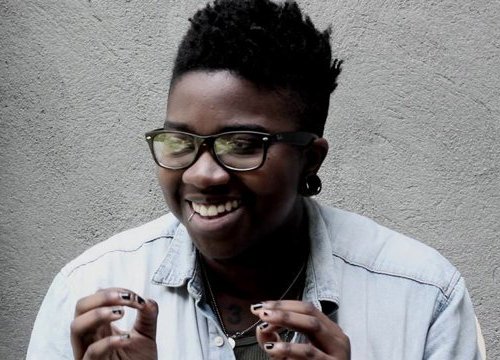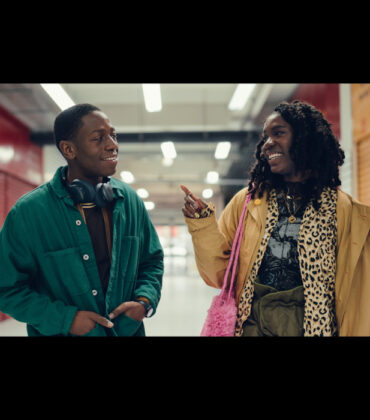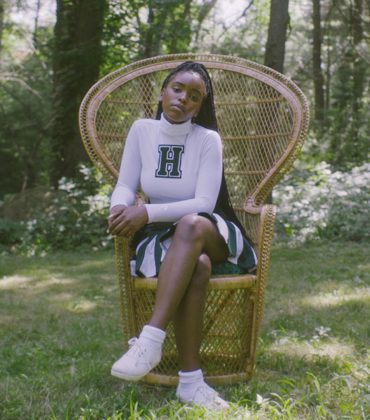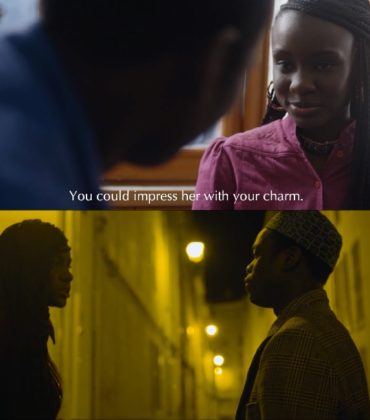
She’s meticulous and passionate about her work, unabashedly queer and well, not at all afraid to speak her mind. Meet multi-media artist Tiona McClodden. Whether it’s through poor depictions on television and film or other subtle ways, society is constantly telling you who they believe you to be and who you should be. Every now and again, there are those who unapologetically challenge stereotypes and standards by simply being themselves. When I conversed with Tiona McClodden there was a sense of no pretense. What she shared with me was exactly what was on her mind at that particular time and she didn’t hold back. Like for instance, her seeming disdain of my home away from home, Atlanta. She stands in her queerness and couldn’t give two fucks what you think of her. She’s talented, her work nuanced and intricate like her latest exhibit “Be Alarmed: The Black Americana Epic, Movement I – The Visions” and this only seems to be the beginning for the ever evolving talent.
#HGM2014 EXCERPTS: Be Alarmed: The Black Americana Epic, Movement I – The Visions | One Year and Seven Days from Harriet's Gun Media on Vimeo.
Andrea: Please introduce yourself to the folks out there?
Tiona: I’m a filmmaker/visual artist currently living and producing work in Philly-North Philly to be specific. I work primarily in documentary filmmaking but I’m now moving into a more experimental type of filmmaking practices. I’m exploring hybrid fiction/non-fiction work and narrative work. Most of my work is based in exploring race, gender, and sexuality in some form. I’d also like to say that I own like one of the first Afropunk t-shirts from a few years back [laughs].
Andrea: How did you get into filmmaking?
T.M: I’ve always wanted to be a filmmaker. Growing up in Greenville, South Carolina I was enamored by films and didn’t really have any idea about how they were made. That fascination stuck and I would eventually go to Clark Atlanta University for two years before dropping out in 2002. Shortly after dropping out I worked with the only mentor I’ve ever had who was at the time working in the Media Department at Spelman College. I was mentored for almost two years in this work but eventually moved into general filmmaking and music videos which financed my first film black./womyn. My mentorship and work in Atlanta was the beginning of everything.
Andrea: Harriet’s Gun is the name of your multi-media distributing firm. Is there a story behind the name?
T.M: I wanted a strong name that would be a metaphor for doing something difficult in hopes of getting to a better place. I’ve always loved the narrative of Harriet, and liked the idea and action of getting “free”. I also think Harriet Tubman is one of the most iconic figures in America in regards to capability and doing something that folks think you might not be able to do. I especially like how folks spoke of her willingness while on her many Underground Railroad expeditions to put a shotgun on anyone that would threaten her mission to free a group. I think that’s how I like to approach my work in regards to being a member of the greater black artist community. I want to create and produce work that advances the mission of blackness in the sense of freedom. Ultimately, I want my work to always be very forward thinking and progressive.
Andrea: How was that transition from Atlanta to Philly?
T.M: I left Atlanta in 2006 for Philly. The move was pretty seamless financially, believe it or not. Atlanta has this rural faux-urban thing going on while Philly is urban as urban gets. Philly is also a less hostile environment for working artists when it comes to production and exhibition of work. I was definitely a country girl having only lived in the South, but I think working in my field has allowed me to fit in exceptionally well in here. North Philly is my home and provides a majority of the aesthetic inspiration within my work. Philly is the birthplace of America so in regards to the great migration and black historical moments in the history of the country there is no place like this.
Andrea: Tell me about the accessibility that artists have in Philadelphia when it comes to showcasing their work?
T.M: I think Philly provides a lot for independent working artists. First of all, there’s the transportation situation within the city and the accessibility to the east coast transit system which is such an interesting thing as someone who drove for so many years. I also treat the east coast like a big ass state-I’m in DC and NY all the time building with fellow artists and exhibiting work as well. Mobility outside of driving was and still is a big thing to me. When I was in Atlanta, there were only a few spots to showcase your work and no funding on a local level. Philly provided me with a chance to exhibit work and explore funding through grants, etc. I also like that there are a lot of working artists who I can talk with and not feel completely isolated. We also have some really dope festivals here-music and film- the BlackStar Film Fest is a big deal for the city. It’s a testament to how folks engage and position Black film and art here.
Read the entire interview over at Afropunk.




